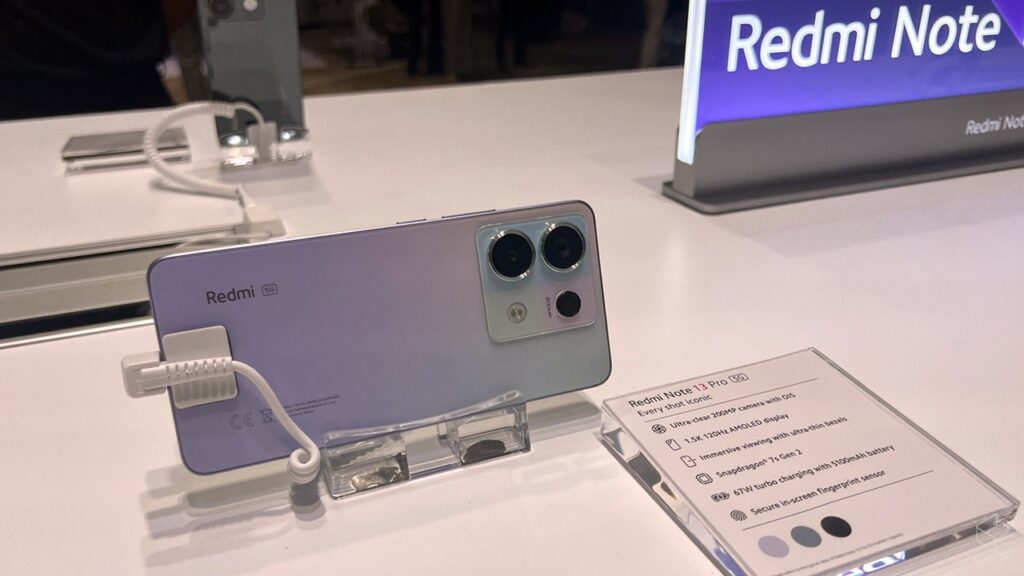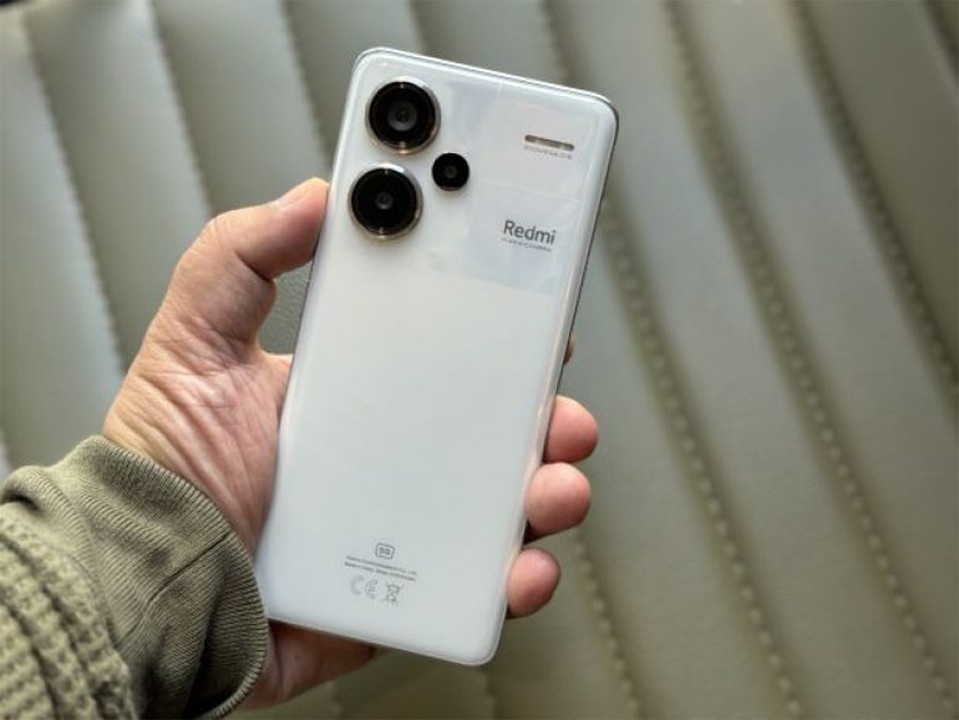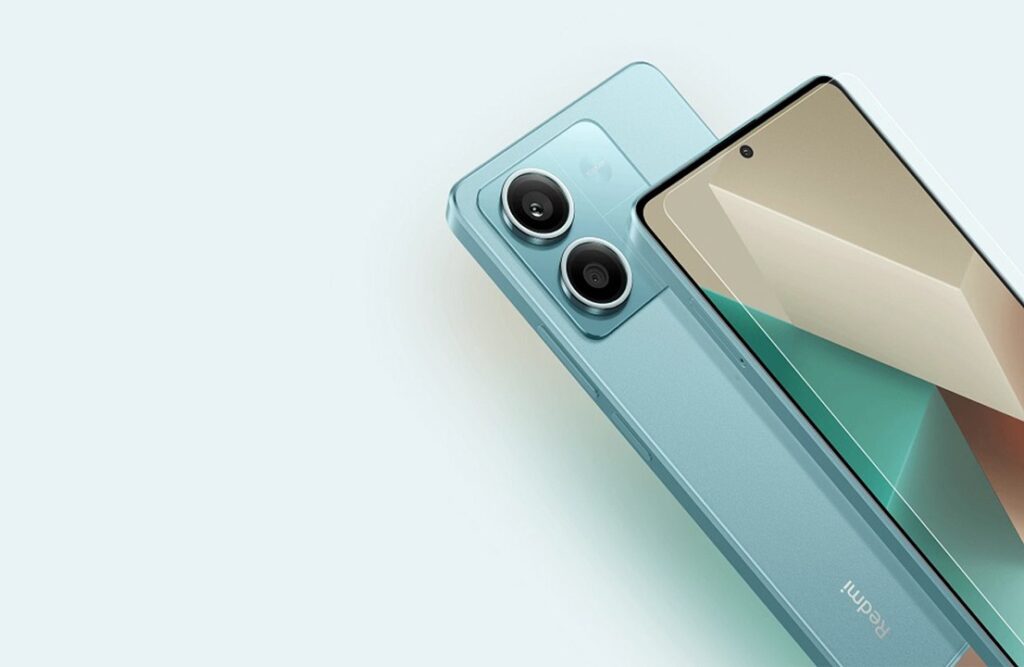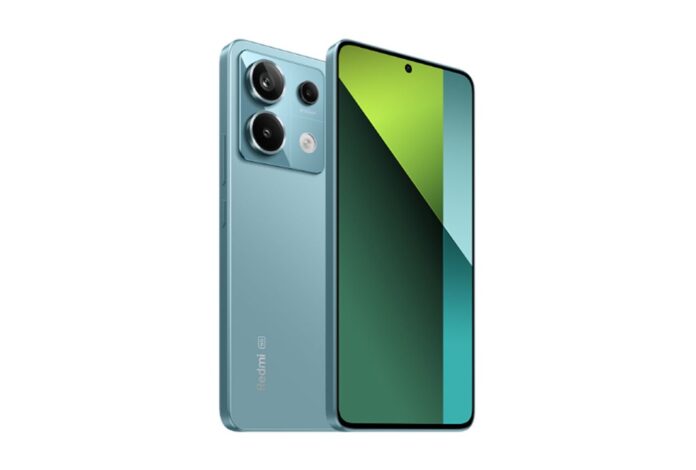The Redmi Note 13 Pro+ (review) is the highlight of this year’s updated Redmi Note series, but the basic Redmi Note 13 5G is likely to be the most popular smartphone among users. That’s because the Redmi Note series is known for its eye-catching features and affordable prices.
The story for this year’s Redmi Note 13 5G remains almost unchanged. The back camera system now features an enhanced 108MP primary camera, and the chipset underneath has been upgraded to MediaTek’s Dimensity 6080 SoC. Furthermore, the base edition has an improved memory bandwidth of 6GB RAM. All the right ingredients for a promising smartphone in the segment.
The Redmi Note 13 5G improves on the Redmi Note 12 (review), making it a great value for many buyers. Its big AMOLED display remains one of the best in the market. The new MediaTek Dimensity 6080 SoC is also capable of decent gaming performance. However, Xiaomi should concentrate on improving the Android experience. Its cameras (in the daytime) are good, if not the finest.
Price when reviewed: €230.46 | Check price at Amazon
KEY FEATURES
The Redmi Note 13 phones have a simple yet elegant design, with IP54-rated ingress protection. Our Redmi Note 13 4G does not have a huge camera housing, which makes it appear even more attractive.
The phone has a 6.67-inch 1080p AMOLED screen with a refresh rate of 120Hz and runs on the entry-level Snapdragon 685 4G CPU. You can choose between 6GB and 8GB of RAM and 128GB or 256GB of storage. There is also an option for microSD expansion. We were expecting an entry-level camera on the Redmi Note 13, but Xiaomi surprised us. The primary camera is 108MP, with an 8MP ultrawide and 2MP macro camera on the back. The other side features a 16MP selfie camera.
The Redmi Note 13 also includes stereo speakers, an under-display fingerprint scanner, and a 5,000mAh battery with 33W fast charging. The phone runs Android 13 with MIUI 14. The Redmi Note 13 appears to be an excellent value, featuring everything a cheap smartphone should have and more! So, without further ado, let’s take this Note out of the box!
Pros
- Crisp display
- Reliable performance
- Sleek design
Cons
- Lowlight photography needs improvements
- No stereo speakers
REDMI NOTE 13 5G UNBOXING
The Redmi Note 13 comes in solid retail packaging with all the necessary accessories, including a 3A USB cable, a 33W power adapter, and a dark gray protective case.

The phone comes with a thin protective coating on top of the screen. It is scratch-resistant, but it also attracts smudges.
CAMERA
The ordinary Note 13 now features a 108MP primary camera, a first for a non-Pro Redmi Note smartphone. The back camera module, which also has a redesigned look, includes an 8MP ultra-wide camera and a 2MP macro camera.
The 108MP primary camera performs admirably. Photos taken in daylight or under favorable lighting circumstances have a balanced contrast and saturation. Details are equally good, however there is a minor softening to remove grain in photographs. If you want to save the details, the native 108MP camera mode works excellently. However, increasing the amount of detail in photos leads to a bigger file size.

The 8MP ultra-wide camera treats the scene similarly to the primary camera, albeit grains in photographs may be more evident. Grains become significantly more visible in low light. The macro camera can now successfully recognize subjects, a huge increase over the Note 12. Despite its focus on macro photos, it still lacks detail. The Redmi Note 13 5G also features an improved 16MP front camera that captures excellent photographs (normal and portrait) in the daytime. However, skin detection remains a concern, as the Note 13 brightens the complexion. While some people may love it, I prefer a more true representation of the complexion. The selfie camera performs even worse in low-light conditions.
There is no OIS for videos, but the EIS performs well in terms of stabilization. Both the front and rear cameras can record full HD at 30 frames per second. Xiaomi may have gained an advantage by providing support for 60 frames per second.
DESIGN AND SCREEN
Historically, Redmi Note smartphones have been recognized for their vibrant colors and showy accents. In contrast, the Redmi Note 13 5G’s white and black color options take a minimalist approach. The white model (Arctic White) that I’m reviewing has a marble-like finish, which I enjoy. The white surface also effectively hides scratch marks and fingerprint smudges. If you want a flamboyant look, there is still a gold model available.
As part of the redesign, the Note 13 has a flatter build. The result is a lower weight and thickness of 173.5 grams and 7.6mm, respectively. The total weight distribution improves the in-hand grip as well.

Other ports and buttons, such as USB-C and the power button, remain standard. The power button also functions as a fingerprint scanner, which is responsive if your thumb is clean and dry. Rests include a 3.5mm audio jack on top, as well as the famous IR blaster used on older Note phones to control home gadgets such as televisions and air conditioners.
The basic Note 13 retains its flat 6.67-inch display, however, the Note 13 Pro+ now has a curved screen. Xiaomi continues to use a Super AMOLED panel with Full HD+ resolution (2,400 x 1,080 pixels) and a refresh rate of 120Hz. According to the company, the phone’s display has a maximum brightness of 1,000 nits. While it is difficult to verify the claim without the right equipment, the viewing experience under harsh sunlight is nevertheless pleasant.
The color calibration is also excellent in the class, allowing you to enjoy media material on your preferred app. There is support for HDR, although it should be noted that the Netflix app requires server-side optimization to fully utilize this display feature. However, watching movies without headphones can be disappointing due to the single speaker at the bottom. If you have Dolby Atmos-compatible headphones, you can enjoy immersive audio.
The Redmi Note 13 5G’s large display and built-in reading mode continue to make reading enjoyable. The 120Hz refresh rate also ensures a smooth scroll experience.
HOW’S THE PERFORMANCE?
The Redmi Note 13 4G is a mid-ranger, not a particularly powerful device. It is built on the Snapdragon 685 chipset. That’s a rather recent part, manufactured on a 6nm TSMC node in early 2023. The CPU department has eight cores to deal with: four Cortex-A73 at up to 2.8 GHz and four Cortex-A53 at up to 1.9 GHz.
The GPU is a 1260 MHz Adreno 610. The Snapdragon 685 is backed up by dual-channel 2133 MHz LPDDR4X RAM. The Redmi Note 13 4G has 6GB or 8GB of storage. There are UFS 2.2 storage chips with capacities of 128 GB or 256 GB. A microSD card allows you to expand your storage. Our review machine has 8GB of RAM and 256GB of storage, making it the highest-end variant.
Let’s start with some CPU tests and GeekBench. Unfortunately, the Redmi Note 13 4G ranks lower on the performance table than its price contemporaries. It still performs reasonably well, although it lags behind the performance of the Dimensity 6080 found in the Redmi Note 13 5G, as well as other popular processors in the pricing range, such as the Helio G99.
Unfortunately, the Snapdragon 685 did not meet our performance expectations. Even in purely practical terms, the chip falls short when it comes to running the phone’s UI smoothly. The Redmi Note 13 4G feels slow and sluggish, rather than slick or snappy. There are no genuine stutters in animations or transitions, which is a nice thing, but performance remains terrible.
Buy it if...
- Full retail package includes a charger and a case.
- IP54-rated, no-nonsense design with excellent colors and Gorilla Glass 3 on the front.
- Stereo speakers.
- Bright OLED with slim bezels, 120Hz.
- A competitive quick charging option.
- There is little to no thermal throttling.
- Excellent main and selfie camera performance.
Don't buy it if…
- There is no HDR video playback support, which is generally popular on Xiaomi devices.
- Battery life could be improved.
- Poor overall performance, with frequent UI slowdowns.
- Video capture is limited to 1080p.
FULL SPECIFICATION
Network | Technology | GSM / HSPA / LTE |
Launch | Announced | 2024, January 15 |
Status | Available. Released 2024, January 15 | |
Body | Dimensions | 162.3 x 75.6 x 8 mm (6.39 x 2.98 x 0.31 in) |
Weight | 188.5 g (6.67 oz) | |
Build | Glass front (Gorilla Glass 3), plastic frame, plastic back | |
SIM | Hybrid Dual SIM (Nano-SIM, dual stand-by) | |
IP54, dust and splash resistant | ||
Display | Type | AMOLED, 120Hz, 1800 nits (peak) |
Size | 6.67 inches, 107.4 cm2 (~87.5% screen-to-body ratio) | |
Resolution | 1080 x 2400 pixels, 20:9 ratio (~395 ppi density) | |
Protection | Corning Gorilla Glass 3 | |
Platform | OS | Android 13, MIUI 14 |
Chipset | Qualcomm SM6225 Snapdragon 685 (6 nm) | |
CPU | Octa-core (4×2.8 GHz Cortex-A73 & 4×1.9 GHz Cortex-A53) | |
GPU | Adreno 610 | |
Memory | Card slot | microSDXC (uses shared SIM slot) |
Internal | 128GB 6GB RAM, 128GB 8GB RAM, 256GB 8GB RAM | |
UFS 2.2 | ||
Main Camera | Triple | 108 MP, f/1.8, 24mm (wide), 1/1.67″, 0.64µm, PDAF 8 MP, f/2.2, 120˚, (ultrawide) 2 MP, f/2.4, (macro) |
Features | LED flash, HDR, panorama | |
Video | 1080p@30fps | |
Selfie camera | Single | 16 MP, f/2.4, (wide) |
Video | 1080p@30fps | |
Sound | Loudspeaker | Yes, with stereo speakers |
3.5mm jack | Yes | |
Comms | WLAN | Wi-Fi 802.11 a/b/g/n/ac, dual-band |
Bluetooth | 5.1, A2DP, LE | |
Positioning | GPS, GLONASS, GALILEO, BDS | |
NFC | Yes (market/region dependent) | |
Infrared port | Yes | |
Radio | Unspecified | |
USB | USB Type-C 2.0, OTG | |
Features | Sensors | Fingerprint (under display, optical), accelerometer, gyro, proximity, compass |
Battery | Type | 5000 mAh, non-removable |
Charging | 33W wired, 50% in 29 min, 100% in 70 min (advertised) | |
Misc | Colors | Midnight Black, Mint Green, Ice Blue, Ocean Sunset |
Models | 23129RAA4G, 23124RA7EO |


